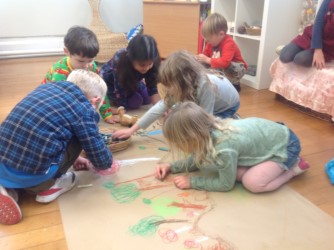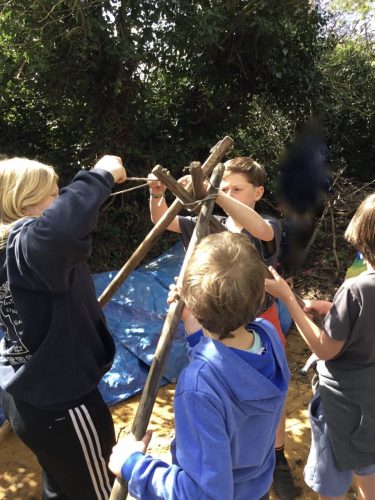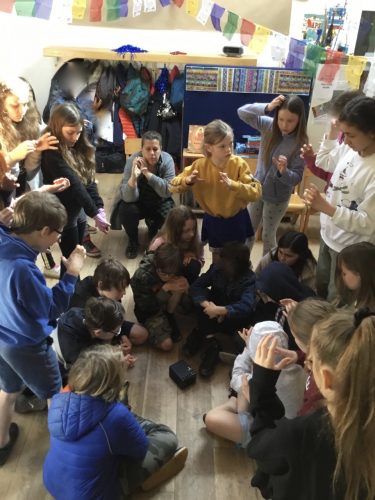Two tenets are central to our philosophy of learning and teaching :
- “No-one learns anything by first mastering skills. Children learn in meaningful contexts – by trial and error, and furthermore this learning must be intrinsically rewarding.” Margaret Donaldson, “Childrens Minds”. (This quotation has appeared on every SIP since 2000)
- We are involved with enabling children to CREATE MEANING not reproduce meaning Bruner, Holt, Vygotsky et al.
Further, we see learning as an interpretative process aimed at understanding reality. By actively relating new understandings to existing beliefs, this kind of learning has the potential to transform a learner’s former perspectives and ways of doing things.
 We also believe that it is not so much the AMOUNT as the QUALITY of the experience that is important and experiences, which engage the EMOTIONS. When this is working well, there will be a feeling of being “in the flow” (see Csikszentmihalyi, amongst others)
We also believe that it is not so much the AMOUNT as the QUALITY of the experience that is important and experiences, which engage the EMOTIONS. When this is working well, there will be a feeling of being “in the flow” (see Csikszentmihalyi, amongst others)
The National Curriculum shows us WHAT to teach (although we often go beyond it). We have been busy developing ways of HOW to teach it and providing contexts for WHY we should learn it:
We are also mindful of the Hadow report as far back as 1931:
“’The curriculum is to be thought of in terms of activity and experience rather than of knowledge to be acquired and facts to be stored’.
For the past twenty years we have been developing a Community of Enquiry approach to learning which has at it’s heart :
High quality heuristic creative teaching (teaching FOR creativity), which makes learning challenging and enjoyable and addresses the needs and learning styles of the individual. Our enquiry based approach to learning:
Builds on what learners already know
Develops learning skills across the curriculum (inside and outside the classroom)
Promotes assessment for learning
Encourages independent learning
Demands a whole staff commitment to enrich the learning experience making learning vivid and real
Ensures that every child succeeds
“Since we don’t have the answers to the problems future generations will face, I don’t think we can afford to “train” children in the name of education. We need to give them tools with which they can outgrow us and yet help themselves. The problems we hand future generations—pollution, a depleted ozone layer, overpopulation, ethnocentrism, the haves of technologically rich countries versus the have-nots of economically developing countries—are not simple, nor will there be simple answers. It is going to take a good deal of research and understanding to unpack the problems and lay bare the issues that lie at the heart of finding real solutions.
For me, education is inquiry and inquiry is education. It is what schools should be about from eight in the morning to four in the afternoon. Education as inquiry is not a clever new way of integrating curriculum. It is a reorientation; a new way of conceptualizing schooling.”
Jerome Harste (Indiana University) from “Critiquing Whole Language and Classroom Inquiry” 2001
The children we teach deserve to learn to face problems which require collaboration, persistence, quality of thought, discussion and communication (whether written,visual, including Technology, or kinaesthetic).
If the messes we hand future generations are to be resolved, it will surely require flexible thinking and effective collaboration.
We have employed, and continue to develop, various strategies which provide realistic and meaningful learning situations in which meaning can be created .
The term we use for our approach is R.E.A.L © learning
(Realistic Experiences for Active Learning)
One of the most effective and all-pervasive used by us is Mantle of the Expert .
It has been summarised as follows:
Mantle of the Expert is a system of enquiry based learning designed, invented and developed at Newcastle School of Education under the direction of Dorothy Heathcote between 1974 1982. It is a medium for learning that positions children as enquirers in an imaginary setting as if they hold a particular fictional ‘mantle’ of expertise. This allows learners to see the world through a new set of ‘eyes’ and use language codes accordingly-hence its application to education.
For example, children have taken the ‘mantles’ (or roles) of historians, museum designers, filmmakers, whale rescuers, artists, and many others.
The teacher as imparter of knowledge or even the better “let’s all find out together” models are turned on their heads as the children are the “Experts” from the beginning of the enterprise. Their self-esteem is raised from the start and expectations are high. The “expertise” is assumed and not challenged and a subtle transformation starts to develop as the children “grow into” their roles.
As experts in their field the children work for an imaginary client, with high standards and expectations, to fulfil a commission. In order to complete the commission the children need to do various tasks: to research, correspond, collate, design and present. And as they work they use the key skills and build knowledge and understanding across the curriculum.
Mantle of the Expert is a system of learning that requires creativity from both children and teacher. It links directly into the themes of the Primary Strategy and has been endorsed by Ofsted: “Throughout the school, much work is very successfully undertaken through Mantle of the Expert enterprises, a way of working that makes learning very real, uses drama to work through problems and cuts across the curriculum subjects as the children lead the direction of their learning, becoming experts in the enterprises they invent.”
Quotes from children in our school over the past few years:
“ Learning’s much more fun this way!” (A bit depressing as I thought my teaching WAS already exciting!)
“It didn’t feel like work!”
“ Let’s find out then, because we’ve got to present it by lunchtime!”
( “Manager” of our Publishing House who was trying to construct an argument for including a coffee shop in our bookstore )
“I think T did really well because she had so much to say and got really involved with running our meeting.” (Child referring to an SEN pupil on a record of support for autism and other needs)
“I had an email last night from our San Francisco branch (fictitious!) and they need a response this morning”
© Bealings School 2019
